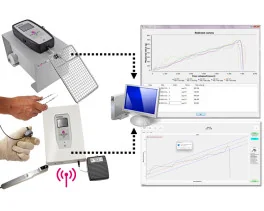Authors
M. Assousa, L. Had-Aissounia, P. Gubellinia, C. Melona, I. Nafia et al.
Lab
Aix-Marseille Université, Marseille, France
Journal
Neurobiology of Disease
Abstract
Parkinson's disease (PD) is characterized by the progressive degeneration of substantia nigra (SN) dopamine neurons, involving a multifactorial cascade of pathogenic events. Here we explored the hypothesis that dysfunction of excitatory amino acid transporters (EAATs) might be involved. Acutely-induced dysfunction of EAATs in the rat SN, by single unilateral injection of their substrate inhibitor l-trans-pyrrolidine-2,4-dicarboxylate (PDC), triggers a neurodegenerative process mimicking several PD features. Dopamine neurons are selectively affected, consistent with their sustained excitation by PDC measured by slice electrophysiology. The anti-oxidant N-acetylcysteine and the NMDA receptor antagonists ifenprodil and memantine provide neuroprotection. Besides oxidative stress and NMDA receptor-mediated excitotoxicity, glutathione depletion and neuroinflammation characterize the primary insult. Most interestingly, the degeneration progresses overtime with unilateral to bilateral and caudo-rostral evolution. Transient adaptive changes in dopamine function markers in SN and striatum accompany cell loss and axonal dystrophy, respectively. Motor deficits appear when neuron loss exceeds 50% in the most affected SN and striatal dopamine tone is dramatically reduced. These findings outline a functional link between EAAT dysfunction and several PD pathogenic mechanisms/pathological hallmarks, and provide a novel acutely-triggered model of progressive Parkinsonism.
BIOSEB Instruments Used:
Activmeter (BIO-ACTIV2-M)

 Pain - Thermal Allodynia / Hyperalgesia
Pain - Thermal Allodynia / Hyperalgesia Pain - Spontaneous Pain - Postural Deficit
Pain - Spontaneous Pain - Postural Deficit Pain - Mechanical Allodynia / Hyperalgesia
Pain - Mechanical Allodynia / Hyperalgesia Learning/Memory - Attention - Addiction
Learning/Memory - Attention - Addiction Physiology & Respiratory Research
Physiology & Respiratory Research




































 Pain
Pain Central Nervous System (CNS)
Central Nervous System (CNS) Neurodegeneration
Neurodegeneration Sensory system
Sensory system Motor control
Motor control Mood Disorders
Mood Disorders Other disorders
Other disorders Muscular system
Muscular system Joints
Joints Metabolism
Metabolism Cross-disciplinary subjects
Cross-disciplinary subjects CONFERENCES & MEETINGS
CONFERENCES & MEETINGS 